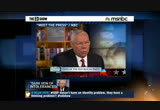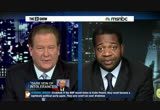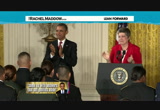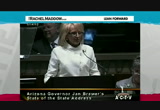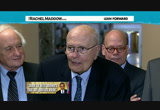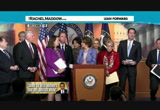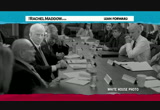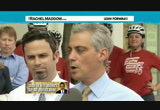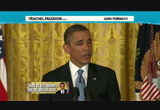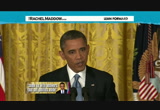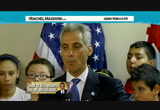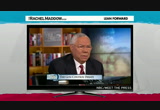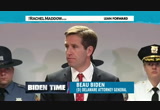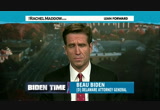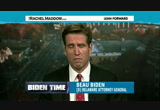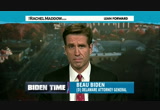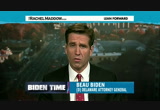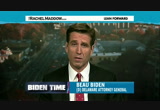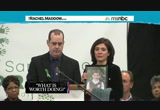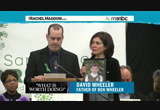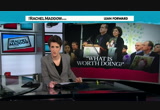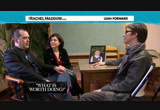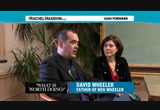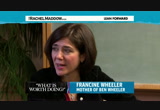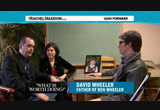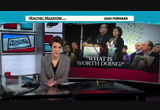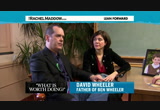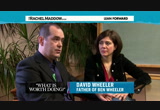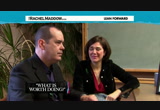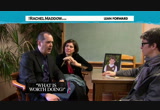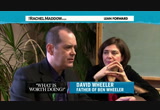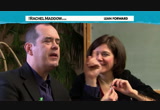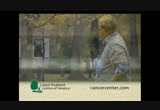tv The Rachel Maddow Show MSNBC January 15, 2013 1:00am-2:00am PST
1:00 am
americans will be the majority of the country, you can't go around saying we don't want to have a solid immigration policy. we're going to dismiss the 47%. we are going to make it hard for these minorities to vote, as they did in the last election. what did that produce? the court struck most of that down. but most importantly, it caused people to turn out and stand in line, because these republicans were trying to keep us from voting. >> now, of course marco rubio, a senator from florida took issue with it. do you see any other republicans coming out, condemning these kinds of laws like powell just talked about? >> well, listen, no one has the kind of strength of conviction that general powell does when it comes to critiquing the republican party. part of that is because he's not really in politics the way some of these folk are. but there to be a reckoning in the republican party. they have to deal with everything he has laid out here,
1:01 am
because the demographics are the destiny for the party. unless they want to become obsolete, they have to pay attention to the issues colin powell laid out for them on "meet the press" yesterday. >> it doesn't sound like you think the republicans are going to take any of his advice. >> there is no suggestion that they will, ed. the proof will be in the pudding. either they will or they won't. but, again, a lot of folk have been talking about these things for a long time. you hope coming from a republican general as respected as general powell will hopefully have some impact. my sense is i wouldn't hold my breath. >> james peterson, good to have you with us tonight. >> thanks, ed. >> i'm ed schultz. "the rachel maddow show" starts right now. good evening. >> good evening. i'm sorry -- >> wait a minute. you're sorry about the vikings. you're sorry about the packers. you're sorry about the broncos. you're sorry about the seahawks. all of my -- in fact, i should be starring on "biggest loser." >> you know -- >> you know, all my teams are gone. >> are you not happy for my patriots at all? reflective glory? no. all right. wow. >> well, they've been around. they've won so much. don't you get tired of winning? no. >> never. thanks, man. i appreciate it. thank you. >> all right, rachel. >> oh. and thanks to you at home for joining us this hour. go pats! all right. just before 3:00 this afternoon,
1:02 am
the office of the vice president of the united states tweeted out this picture. this picture. this is the final meeting that we know vice president biden took in washington. part of his big high profile effort to put together proposals for policy reform after the newtown elementary school massacre last month. there is a lot going on in this photo. the vice president is there obviously in shirt-sleeves on the right side of your screen. immediately to his right, wearing glasses there, that of course is secretary of homeland security janet napolitano. the white house just announced today that she will be staying on for a second term. now the department of homeland security is not old enough that there are traditions yet as to how long people stay on once they have the secretary job. but this be the first time that somebody has kept the gig for two terms, if secretary napolitano stays throughout the president's term in office. of course, to become homeland security secretary in the first place, janet napolitano had to step down from her old job, which was being governor of arizona. we just passed the two-year anniversary of the mass shooting in arizona in tucson. this past week, the congresswoman who was almost
1:03 am
killed in that shooting, gabby gifford, she and her husband, astronaut mark kelly announced a major new effort to raise $20 million for a new pac to compete with the nra and to support a pro reform agenda. part of the political power there is not just that gabby giffords was nearly killed in that pass shooting in tucson, but also that she and her husband are both gunowners and out and proud supporters of the second amendment. but they're nevertheless saying there needs to be reform. in fact, are saying that respect for the second amendment and reform are not incompatible things. well, today in arizona, the person who became governor once janet napolitano went to washington to become homeland secretary, the governor after janet napolitano, jan brewer gave her state of the state address, regardless of the tucson anniversary, regardless of gabby giffords, regardless of arizona's own history with gun violence, jan brewer's own treatment of that issue today in her state of the state address was that she emphatically would not be infringing on the right
1:04 am
of law-abiding gun owners. that's all she had to say. in d.c., though, there is the previous arizona governor janet napolitano at the right hand of the vice president in this meeting about possible reform at the federal level. now immediately to janet napolitano's right, further down the table, that is congresswoman elizabeth esty. she is a brand-new member of congress. she represents connecticut's fifth district, and that includes newtown and sandy hook. overall in terms of the main composition of the photos, you can see from the way the whole photo is set up, the person who is talking, who everybody in the picture is paying attention to is the guy sort of out of focus on the left-hand side of the photo that is john dingell, congressman john dingell of dearborn, michigan. congressman dingle is 86 years old. he is in his 30th term in congress. a few months into this term for him in june of this year, he will become the longest serving member of congress in american history. nobody since the dawn of the republic will have served as
1:05 am
much time in congress as john dingell as of this june. john dingell is a democrat. he has been his entire career as far as i know. he is also a staunch proponent of gun rights. he is a former board member of the national rifle association. now what is going on in this photo from the vice president's office today is that john dingell is speaking to this whole group of cabinet officials and the vice president himself and his fellow house democrats, and he is speaking to them as one of the 12 vice-chairman of the democrats gun violence prevention task force in the house. this group was set up by nancy pelosi last month to be the voice of congressional democrats on reform. and it tells you something about the diversity of the democratic party on this issue, right, to be able to have nancy pelosi, who has the exact position on guns that you think she has, to have a nancy pelosi drafting leadership help on this issue from, among others, john dingell, a former board member of the nra, a former a-plus rated nra legislator.
1:06 am
but for all of congressman dingell's nra bona fides, if you think that is the only thing worth knowing about him, you are missing a big part of the picture. last month, congressman dingell's wife, debbie dingell published a very personal op-ed in the "washington post." "when i was about to start eighth grade, my father almost shot my mother. it was another of their many ugly fights. i got between them literally and tried to grab the gun. i will never forget that night. the shouting. the fear. the raw fear that we would all die, my brother and sisters along with my parents. my calling for help, but the police not coming. my parents were important people in town. my mother running out of the house. i locked my brother and sisters in a bedroom and pushed a bed against the door. my father broke in, took the door off the hinges and pulled the phone from the wall. he took the knobs off all the doors so no one could get out and no one could get in. we survived that occasion physically. emotionally, i'm not sure."
1:07 am
she goes on to say "i don't have all the answers, but i know two things. decades later i still feel the fear of that night when i was 12 years old. and while ordinary americans do not need access to assault weapons, i also know that banning all guns won't fix the problem. we need a new dialogue that does not pit people against each other." that's congressman john dingell's wife debbie dingell reflecting on her harrowing experience as a child and how that informs her family's thinking on this issue. it's a complex issue, and there is complex thinking about this issue. now, the man immediately to congressman john dingell's left in the vice president's photo today, the man who frankly is looking at john dingell intently enough that it looks like he might set him on fire if he keeps that stare going on too long, that is congressman mike thompson. he is the overall chair of this task force for the congressional democrats. mike thompson is a rural california democrat. he is a wounded vietnam combat veteran. he is a gun owner himself. he says on the day of the newtown shootings last month,
1:08 am
when he learned of the shootings, he had been out that morning duck hunting. >> first and foremost, i'm a >> first and foremost, i'm a gun owner, and i've been a gun owner as long as i can remember and hunted all my life. and a strong proponent of the second amendment. but i'm also a parent and a grandparent. and i know that we can own guns and use guns safely and properly. >> congressman mike thompson speaking today at an event with rahm emanuel, the former white house chief of staff and the former democratic congressman and the current mayor of chicago. mayor emanuel today announcing that chicago will seek to divest its pension funds, which are big investment vehicles, those are a lot of money, he will seek to divest them from all gun manufacturers. this follows the lead of california's state teachers pension fund, which has done much the same thing. mayor emanuel says he will try to get other big city mayors to follow suit. now, there are all sorts of new political pressures and new political tactics. and unlikely political combinations and conversations
1:09 am
happening right now on this issue. on the one-month anniversary of the newtown shootings. today at the white house, president obama held what will be his final press conference of his first term as president. and even though his opening statement was all about the debt ceiling, the first question he got from the press today was about guns. >> the vice president and number of members of my cabinet went through a very thorough process over the last month, meeting with a lot of stakeholders in this, including the nra. listened to proposals from all quarters, and they've presented me now with a list of sensible common sense steps that can be taken to make sure that the kinds of violence we saw at newtown doesn't happen again. i'm going to be meeting with the vice president today. i expect to have a fuller presentation later in the week to give people some specifics about what i think we need to do.
1:10 am
my starting point is not to worry about the politics. my starting point is to focus on what makes sense, what works. what should we be doing to make sure that our children are safe. >> the president and his press conference today didn't announce this as if it were news, but this is news what he just said. remember, when president obama asked joe biden to head up this effort looking at potential reform, remember, he initially said the effort was supposed to produce recommendations by the end of january. and so it was big news last week when we heard that vice president biden was actually planning to report to the president early. he wasn't waiting until the end of january. he was going to report in mid-january. he was planning on reporting hi recommendations by tomorrow, by tuesday. but then today at this press conference, we learned that actually, the vice president has already made his report to the president today. the vice president pushing up the time frame yet again. and president obama saying today that he will make further remarks later this week telling us what is going to happen next,
1:11 am
given those recommendations. this is faster than the president even said it was going to happen. and he initially said it was going to happen fast. speed it turns out is central to the strategy. and that is turning out to be true both in washington and in the states that are moving ahead. as we speak, new york state is closing in on a deal. earlier this evening, it was said to be 99% done. the state planning on enacting reform suggested by andrew cuomo and agreed to by the bipartisan legislature. in maryland, maryland governor martin o'malley and colorado, the governor there, hickenlooper, in connecticut, dannel malloy have all announced ambitious legislative proposals within their own states. delaware governor jack markell announced legislation to curb gun violence at n his state. and the divestment from chicago mayor rahm emanuel. today some of the parents from the children killed in the massacre are taking their own way forward which is not built on speed, but is meant to be its
1:12 am
own instructive, inclusive ignore the extremes the way forward. tonight we have an exclusive interview with one of the parents on this show with one of the parents of a little boy killed at sandy hook. this is not the kind of interview i normally do on this show or in any circumstance. it is a remarkable experience, and i hope you will stay with us to watch that tonight. we've got that coming up. we have beau biden joining us live to announce the measures he announced in his state today there is a lot going on. stay with us.
1:14 am
1:16 am
after the connecticut massacre, what's the solution? what kind of restrictions should be put in place? >> it's a very complex issue, and i'm anxious to see what vice president biden is going to come up with, because, you know, you have deranged people throughout the country, unfortunately. and they're a part of the problem. you have to be deranged to pick up a bushmaster or some weapon and go into a school and kill people. so how do we deal with that part of the problem. is there an issue with violence on television, violence in our games that has to be looked at. with respect to guns themselves, i'm a gun owner. i'm a believer in the second amendment. i know the amendment rather thoroughly. i know the issue of a well regulated militia. but at the same time, we also have a responsibility under the constitution and the bill of rights to protect our people. so surely we should be able to
1:17 am
find some meeting of the minds on this issue. why can't we test everybody, or have everybody run through a screen to make sure they're a responsible person before they're allowed to buy a weapon, either in a store or in a private transaction? why can't we do a better job of registering things? and with respect to assault weapons, i see no need for bushmasters in the hands of an individual person who might be deranged. you want the fire a bushmaster, go out to a range and fire a bushmaster. but whether or not it's in our overall interest to have these kinds of weapons in the hands of americans who might not be responsible is a question we have to answer. how much are we really giving up if we said that this kind of weapon should not be readily available to anybody who wants to buy one? >> does assault weapons like the bushmaster have a place in our society here in america? what is your position, especially given the recent events? >> i spent a career carrying
1:18 am
typically they're an m-16, and then later an m4 carbine. and an m4 carbine fires a 5.65 millimeter at about 3,000 feet per second. when it hits a human body, the effects are devastating. it's designed to do that. and that's what our soldiers ought to carry. i personally don't think there is any need for that kind of weaponry on the streets, and particularly around the schools in america. >> what is your message to the nra, to members of the house judiciary committee, republicans, who say this isn't a topic for federal legislation? >> i think my message is we've got to look at the situation in america. the number of people in america killed by firearms is extraordinary compared to other nations. and i don't think we're a blood thirsty culture. so i think that we need to look at everything we can do to safeguard our people. >> general stanley mcchrystal, former commander of u.s. forces in afghanistan and before him general colin powell, former
1:19 am
chairman of the joint chiefs, former secretary of state. there is something about hearing men who have careers like theirs espousing views like those that sort of calls the threatened masculinity bluff of the particularly agro fringe of the anti-gun regulation world and the industries that stoke that. today one of the highest profile iraq war veterans in the country, the top law enforcement officer in his state, delaware's attorney general beau biden joined the mcchrystal and powell side of the argument in his official capacity when he and delaware governor jack markell announced a five-point plan for gun reform. >> you know, i wear a different uniform. and the assault weapon and military-style weapon that is assigned to me resides in an armory under lock and key. because it's needed only for one place, and that is iraq or
1:20 am
afghanistan or where the commander in chief, this commander in chief of the delaware national guard or the commander in chief of our united states armed forces sends soldiers, sailors, airmen and marines. these are weapons of mass destruction that are meant for battle. >> joining us now live is the attorney general for the state of delaware, beau biden. mr. attorney general, thank you very much for being with us tonight. >> happy to be on, rachel. >> i wanted to play that clip of you mentioning your service in the military at the press conference today just because i wanted to hear in your own words why you raised that issue and how -- how your time in the service informs your thinking on this issue. >> well, i've been in the military now for nearly ten years. and for most of my career, i had an m-16 assigned to me. i now am assigned an m-9, a 9 millimeter pistol. these are weapons that are designed to protect the soldier or the military personnel, do damage. and it's what we take into battle.
1:21 am
they're made for the military. but they're not made for our neighborhoods and our communities. and so that's why i came out today, joining my governor and our lieutenant governor, you know, calling for among other things a ban similar to the one in 1994 that passed the united states congress to ban assault weapons. they simply don't have a place in our neighborhoods. they're made for the battlefield. if you want one, you know, maybe a good way to go is to sign up for the national guard or join the military. but i don't see any utility for them in our neighborhoods and in our streets of my city. >> looking at the new gun control and gun reform proposals in various states since newtown, including new york and maryland and colorado and connecticut and your state of delaware, should we see a single message that these states are sending to the country? obviously, in these states, maybe reform is more possible than in states that are more bright red in their political affiliation. but is there something that the
1:22 am
country should understand from these states where it might really be possible to move ahead? >> i think the most important thing, the thing that i'm most hopeful about are the five pieces of legislation we put before our state today, our governor leading the charge jack markell is the universal background check. as you know and you have covered on your show in great detail, in 1968, in the wake of the violence of that year, the united states congress passed the gun control act, which basically said that there are seven categories at that time. there are now ten categories of -- categories of people that are prohibited from the ability to possess firearms, that they basically lost their second amendment right, which i believe in, and they forfeit it. and that category includes people who have been convicted of felonies, that are fugitives from justice. in fact, federal law since 1968 says people who are using or addicted to drugs are prohibited
1:23 am
from possessing firearms. those who are adjudicated mentally ill. the most important thing we can do as a nation and state by state is making sure there is a universal background check. since its inception, and that is the nix system, the background with the brady law, there has been approximately two million prohibited persons who have tried to purchase firearms that have been stopped. nearly 48% of those people have been convicted felons. i think it's one of the most important thing we can do. i think it's a thing that is going the pass in this state. i think that's why you see governors o'malley and cuomo and others going forward on that. but it's most essential, most important for the united states congress to act on that. because you need uniformity in all 50 states to adopt this to make it really protect our citizenry the way it needs turkey, delaware attorney general beau biden with your father helming this issue at the federal level, and you taking this up along with your governor, the lieutenant governor in delaware, is there something that you understand
1:24 am
from this sort of unique position you're in both family and workwise about the division of labor here, about what is needed for country versus what is needed at the state level? >> well, i think you're seeing governors act because, you know, they're out there talking day to day with the citizens in their state. but i think you see as you covered in the top of your show, the president of the united states and the vice president are moving very quickly on this. they're going to get legislation before congress to get them to act. i encourage the congress to do that. i know the administration is moving very rapidly on that. i think that has to be kind of a three-part strategy here, and i think that's what you see being developed at the white house. number one is what can we do about gun violence. number two, how do we address school safety. and number three, how do we deal with the mental health issue, because behind many of the shooters, from ronald reagan's would-be assassin all the way
1:25 am
through what happened, the tragedy in connecticut 30 days ago has been someone with some mental illness and derangement. so i think we have to have, for instance, a very robust discussion. i anticipate, or i'm looking forward to seeing the task force suggests, a discussion for instance, rachel on whether the category of probative people who have been adjudicated as mentally ill, that's what the law says, essentially, they're prohibited, whether or not that should be broadened. for instance, should a person who has a diagnosis from a psychiatrist as being a paranoid schizophrenic be able to go into walmart tomorrow morning and buy a weapon? under the current law, without having been adjudicate as mentally ill in a court of law, under federal law, they would be able to do that. we have to have a serious discussion whether or not that category needs to be expanded. and what you're going to do is bring in a whole bunch of people who have very interested on that. you're going to have nra interested in that. people have interested in privacy concerns interested in that it's part of the reason i'm straight forward about this is why that category of citizens that have been adjudicated mentally ill, that part of the
1:26 am
database has not been populated to the extent it should be because there is obvious concerns on the part of the people who have been adjudicated as such to not be in a computer somewhere because they don't want their privacy invaded. so there is very complicated issue here is that need to honor the second amendment, but honor other pieces of the constitution that sprinkle throughout the constitution is rights of privacy and whatever amendment you look like essentially in a bill of rights. so there is competing interests here that have to be balanced. i know that the task force has been very thoughtful about doing that. i look forward to seeing how that actually fleshes out. >> delaware attorney general beau biden. thank you so much for joining us tonight. keep us apprised, sir. thank you. >> thank you. >> thanks. all right. the president's second term starts this weekend. what the second term is going to look like from his own administration's perspective. we've got some big news on that today. plus, we on this show have a big exclusive interview tonight still to come. please stay with us. going to s, but when you wake up in the middle of the night it can be frustrating. it's hard to turn off and go back to sleep. intermezzo is the first and only prescription sleep aid
1:27 am
approved for use as needed in the middle of the night when you can't get back to sleep. it's an effective sleep medicine you don't take before bedtime. take it in bed only when you need it and have at least four hours left for sleep. do not take intermezzo if you have had an allergic reaction to drugs containing zolpidem, such as ambien. allergic reactions such as shortness of breath or swelling of your tongue or throat may occur and may be fatal. intermezzo should not be taken if you have taken another sleep medicine at bedtime or in the middle of the night or drank alcohol that day. do not drive or operate machinery until at least 4 hours after taking intermezzo and you're fully awake. driving, eating, or engaging in other activities while not fully awake without remembering the event the next day have been reported. abnormal behaviors may include aggressiveness, agitation, hallucinations, or confusion. alcohol or taking other medicines that make you sleepy may increase these risks. in depressed patients, worsening of depression, including risk of suicide, may occur.
1:28 am
1:30 am
1:31 am
ourselves to the task of being the best possible parents for our surviving son nate. what we have recently come to realize is that we are not done being the best possible parents we can be for ben. not by a very long measure. if there is something in our society that needs to be fixed, clearly healed or resolved, that resolution needs a point of origin. it needs parents. i would respectfully request that every parent in this country who hears these words simply pause for a moment and think. ask yourself what is it worth
1:32 am
doing to keep your children safe. what is it worth to you? what is it worth doing? what is worth doing? >> one month after the mass shooting at sandy hook elementary school, today some of the parents who lost their children that day spoke publicly for the first time. they announced the formation of a new group and a campaign to contribute their leadership to what they want to be a national long-term response. david wheeler is the father who explained today how he and his wife francine see the possibility to speak publicly
1:35 am
[ heart beating, monitor beeping ] woman: what do you mean, homeowners insurance doesn't cover floods? [ heart rate increases ] man: a few inches of water caused all this? [ heart rate increases ] woman #2: but i don't even live near the water. what you don't know about flood insurance may shock you -- including the fact that a preferred risk policy starts as low as $129 a year. for an agent, call the number that appears on your screen. one of the first graders who was killed at sandy hook elementary school a month ago today was 6-year-old benjamin, ben wheeler. ben was in first grade. he was athletic and mischief and outgoing. he was funny. he had good comic timing. he also had perfect pitch.
1:36 am
his older brother nate is 9. he was at the same school in the fourth grade. nate survived that day at sandy hook, but ben did not. today nate and ben's parents, francine and david agreed to sit down with me in newtown. this is one of the first chances we have had as a country to hear in-depth from parents who lost a kid that day. >> david and francine, thank you for wanting to talk. >> sure. >> i was sitting today sort of in the back of the press conference, and you guys were up on the stage at the beginning. and at that one moment when you all stood together and we could all see that you're all holding pictures of your kids, i felt like it was a wave washing over everybody who was there. it was so powerful. can you just tell me about your decision to do this. tell me about what it meant to have ben's picture with you while you wanted to talk today? >> that was my idea about the
1:37 am
picture, because i just felt that he is still here, you know. and he needs to be part of the group as well as the other children, you know, and the teachers, because we made a promise to him to be the best parents we could be. and so i wanted him to be there so he knew i could protect him and include him even though it's his spirit with us and not his body anymore. so. >> david, when you talked about redoubling your effort to be the best parents that you can be to nate, to your surviving son. >> right. >> but also needing to be the best parent you can be to ben now, what did you mean by that? what does that mean? >> well, in the past month and immediately after, you know, one of the things that hits you like a ton of bricks is your responsibility.
1:38 am
and it hits you in ways that are unexpected. it hits you in ways that are not necessarily helpful. it approaches -- it comes to you the issue of being able to protect your children and to be -- i mean, that's our only job as parents, you know, let them leave the nest. get them so that they can leave the nest. that's all you have to do. and then something like this happens and calls that entire concept into question. so you got to deal with that on a whole bunch of levels. you to figure out how you feel about all of those things. and once we had worked through some of the less pleasant -- and we're not entirely through that. don't get me wrong. but once we had sort of come to terms with those, it occurred to me that we're still his parents. we're never not going to be his parents. and that's part of the process. and that wasn't always the case, you know.
1:39 am
people react in very different ways. and if you shut it down and you close the doors, and you pretend that what happened didn't happen, or you tried to remove that person from the tree, the long-term consequences of that kind of reaction are devastating, and i mean generationally devastating. and that's never going to happen in our family. and we would never do that to ben. and it made me realize that our job for him is to continue to do, to be the greatest parents we can be. because as i said, we're never going to stop being ben's parents. and that's complimented and made more difficult by being the best parents we can be for nate, who has his own journey.
1:40 am
>> yeah. nate said right after ben died, he said, this is tough, but he said "you promised you would protect us." and i did promise him that. >> sure, you know. so what do i say to him? i can't change what happened. i know it wasn't our fault. we just sent him to school. but i'll do whatever i can to help protect nate and protect ben's spirit. >> it's only been a month, and you had a decision to make about whether to stay private, or whether to be publicly available to talk about these issues, not just now, but at this event today. when you made that decision to be public today, to take part in this conversation the way you're talking about in this larger way to continue the sense of responsibility in a way that involves the rest of us and not
1:41 am
just your own family, does that feel like an additional burden on top of the grief that you are dealing with, or does that feel constructive to you in terms of how you feel just as people? >> in the moment it feels okay because i have to go with my gut, and when david said i really want to make this statement in my gut, which i think sometimes is ben, you know, said yeah, yeah. so right now i feel it's the right thing. it was not the right thing the day after he died. >> not at all. >> and that was hard, because everybody was pouring out their love, and i couldn't even respond yet. and i still can't a lot of times. >> sure.
1:42 am
>> but i also feel that you have to go with your gut. that's who i am. and i just hear him. i hear him saying "mama, i love you, i want you to live." and this is how i'm going to live. >> i know you have taken steps to close off the news. >> we haven't seen much at all. >> which sensible, even under the best of circumstances. do you have a sense, though, maybe you have a better sense of not watching it through the media filter of how much the country has changed since the day that ben died. i'm telling you that my assessment is that we are having a different reaction to this as a country than we ever had to any other mass shooting. do you guys know that? do you feel that? >> i think we do in a couple of ways. it's very, very comforting to hear you say that, for one thing. i -- we recognized it -- we didn't get our mail for two and a half weeks. our mail was diverted to a warehouse in town and held because there was just too much
1:43 am
of it. you would not have -- it would have been a little fleet of trucks every day. and they couldn't do that. so they held it. and then they delivered it in boxes. and we had -- >> beautiful letters from children. >> so many letters. and they're from all over the world. so when we started combing through that stuff, which only happened last week, we started to get a sense, a real palpable, tangible sense of how big this -- how big this response is, and much these people about this. >> our close ones have been protecting us, you know. they haven't even -- >> but from every corner of the globe. >> we hear. and i think the children's letters are my favorite. >> yeah. they're pretty great. they're pretty great. >> we haven't shown them to nate yet, most of them, although nate has gotten his fair share of mail. >> he has. >> i want him to some day be able to read them too. >> some people have written some
1:44 am
amazing letters to me, wonderful, wonderful letters that i think are going to help him as he goes through this. because as i said before, he is in this for the long haul. this is with him forever. and how he deals with that, how we sort of help him deal with that going forward is a big, big chore. but he is -- he'll get there. and -- >> he is grieving. >> oh, yeah, no question. there is no question. he is doing it his way. >> and he also was there. so, you know, he has a lot he is struggling with. >> what grade is nate in? >> fourth. >> he is in fourth, and ben was first. >> yeah. he was in the gym at the time. >> he did tell us one day he would write a book about this. >> he did say he was going to write a book. >> i believe him. >> we're talking to publishers now. [ laughter ] >> david and francine wheeler who lost their 6-year-old ben at sandy hook elementary school last month. they were speaking with me today in newtown, connecticut there is more. we'll be right back.
1:48 am
today in newtown, connecticut, at the announcement of this group the sandy hook promise, the founders of the group and the parents of kids who were killed at sandy hook elementary talked about how they cannot stand for the response to this tragedy to be the same short flurry of attention that we are used to followed by the same long-term nothing that we
1:49 am
are used to. i sat down today with david and francine wheeler, who lost one of their two sons, 6-year-old ben at sandy hook. >> there's been a lot of focus from newtown united, which is now sandy hook promise on the process of not rushing, not taking political stands, not giving thumbs-up or thumbs-down to any policies that are debating. meanwhile, policy debate is moving fast. how do you two feel about that, that emphasis on process on the conversation on being deliberate, slow about it? >> well, we have to do this. and i say we casually, because, you know, i'm -- i should assume now that i'm part of this group, i suppose. i think that's safe to say. but the core members and the executive group, they feel very, very strongly that this approach
1:50 am
that they take has to be different. you heard tim makris say it, that it can't be the same thing that has done in the past because it hasn't worked. it hasn't worked. so the policy debate may move quickly, but we all know that legislation does not move quickly. and we know that government doesn't move quickly. and we know that culture and societal change probably -- well, not probably, moves much slower than that. it's glacial. so there may be quick moves in legislation here. there may be quick policy announcements or quick policy stances taken by lots of different people. but we're talking what this group is talking about is change
1:51 am
that may outlast a great number of legislators' careers. so this may good through a couple of generations of people in positions of representation. and if that's what it takes, that's what it takes, because we're all in it for that long. so i'm not concerned. i don't concern myself with statements about, well, this can't happen now, or we have enough votes for this or that, or we can protect this or that in terms of whatever policy may be available. look at the history of our country, the safety measures we put in place to make the country safer, you know, any number of things. it never happens overnight. >> and the other part is we're still really grieving. >> sure. >> so a lot of this -- the stuff that has been happening with legislation and policy, and i wouldn't speak for you, david. but i'm not there yet. i'm not there. >> no. >> i'm here. you know? that is where i am. >> yeah, i don't -- i don't profess to know anything about that stuff. i know about ben. >> and i'm always going to talk about ben forever, forever. >> as the country continues to respond to what happened at sandy hook, we have talked
1:52 am
ourselves into the idea that the way to respond as a country is policy response. and we're now starting to find out what the policy response is going to be. and that is happening quickly at the state level in a number of states. and it is happening at the federal level. that is what we, the country, have decided is the right way to respond. from -- is there something you want the country to be doing other than policy? is there something that you need from the country, as parents of ben that you have not gotten or that you want or that you could hope for? >> well, policy is shaped by a relatively small group of people. >> yes. >> so i think what we want is for larger groups of people than
1:53 am
policy-makers so just keep talking. because those are the groups that will then affect the policy-makers. i think policy is an incredibly important part of this response, but when we say policy we have to be very careful to make sure we're talking about very, very many kinds of policies. public security, and safety, mental health, the three prongs that you heard today. so yes, policy is crucial. and if it can be affected quickly, terrific. it better be efficient, and well thought out, because when it is not it is a rabbit hole. but what i think i want the country to do is just don't stop thinking about this. just keep thinking about this. keep this in your head. talk to each other. talk to your teachers, talk to your kids, talk to your fellow parents. talk to your kids, you know, and i don't mean to over use the cliche, but have the conversation. it is not enough to turn off the news and walk away from the tv and go, oh, that stinks. not this time. >> and it is not just
1:54 am
republican, democratic, independent. that is the thing that has just blown my mind. that i feel like it is really not about your party right now. >> it is not, it is not. >> i really feel like it is about our children. so i would say that at this moment, that i -- my gut is telling me that we have to continue to talk about the children. they are the future of this country. and it is going to -- you know, they're going to be the next set of parents. and they would want the set of things we want. protection and safety. and you know. i think that is -- >> you know there are much larger cultural and societal issues here. i -- we can't even begin to address those because they're just so enormous. but you have to start somewhere. you have to start somewhere. and i love the idea that this group has put forward saying
1:55 am
that sandy hook, you know, a new town will be remembered not for the tragedy but for what started here. that is crucial. >> the change that started here? >> yes, exactly, exactly. >> francine and david, thank you, again, for being willing to talk with anybody who you don't have to talk to. and certainly, with us. will you stay in touch? >> yes. >> thank you, guys, thanks. >> thanks rachel. >> sandyhookpromise.org. you should go there and check it out. david and francine wheeler, the parents of ben, killed at sandy hook elementary school a month ago. i'll be right back. >> this has some of ben's ashes in it. and we had recently -- i might have told you this, we had recently discovered he had perfect pitch. >> she was at a recital, and they were at the cafeteria, she stops to talk. she said he sings a note -- >> yeah, because i don't have perfect pitch. >> and he finds it --
1:56 am
>> yeah, he understood intervals and -- and there is one thing that my father always says, my dad would always say ben is going to do amazing things. and i always say, now, i just didn't know it was going to be in his death. i thought it was going to be in his life. so he is going to do amazing things now. >> uh-huh. >> right? >> sure, and his classmates, absolutely. >> through you, and through their memory? >> uh-huh. >> the memory. >> that is beautiful. >> thank you.
1:59 am
184 Views
IN COLLECTIONS
MSNBC West Television Archive
Television Archive  Television Archive News Search Service
Television Archive News Search Service  The Chin Grimes TV News Archive
The Chin Grimes TV News Archive 
Uploaded by TV Archive on

 Live Music Archive
Live Music Archive Librivox Free Audio
Librivox Free Audio Metropolitan Museum
Metropolitan Museum Cleveland Museum of Art
Cleveland Museum of Art Internet Arcade
Internet Arcade Console Living Room
Console Living Room Books to Borrow
Books to Borrow Open Library
Open Library TV News
TV News Understanding 9/11
Understanding 9/11